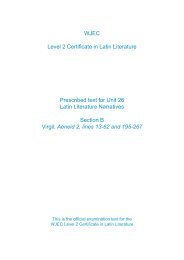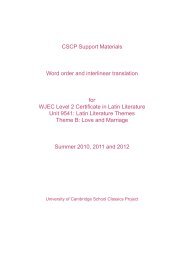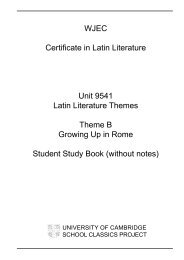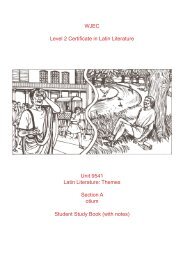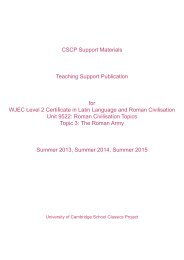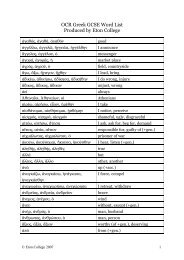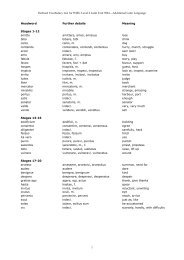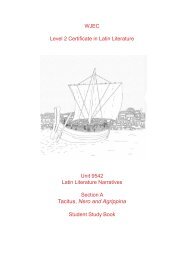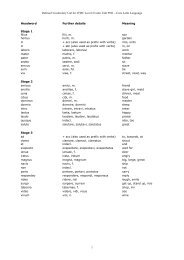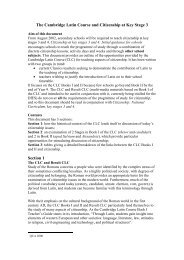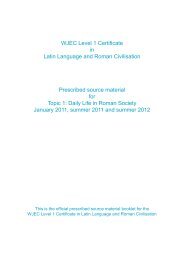2. Student Study Book - Cambridge School Classics Project
2. Student Study Book - Cambridge School Classics Project
2. Student Study Book - Cambridge School Classics Project
You also want an ePaper? Increase the reach of your titles
YUMPU automatically turns print PDFs into web optimized ePapers that Google loves.
28. Read lines 8-11 (aloud if possible) or listen to the audio on the CSCP website.29. <strong>Study</strong> the vocabulary for these lines.30. Read lines 8-11 (or listen to the audio) again.31. at (line 8) and sed can both be translated as but. However, at is the stronger word. Cicero uses it here tointroduce an unexpected reaction to Quintus’s words.3<strong>2.</strong> Who is illa (line 8)?33. What does she say about herself (line 9)? (hic is an adverb meaning here.)34. Translate the ablative absolute phrase audientibus nobis (lines 8-9), first literally (with us …), then in naturalEnglish, e.g. in our ….35. Which two of the following explanations for Pomponia’s remark are true?(a) she has forgotten that she is the mistress of the house(b) she is being sarcastic when she calls herself a hospita(c) she is flustered by the need to organise lunch(d) she wants to make it clear to Quintus that she has no intention of doing what he has asked her36. Which of the following is the literal translation of Pomponia’s words, and which translation best conveys the toneof her remark?(a) Oh, I’m only a guest here(b) Even I am a guest here(c) I myself am a guest here37. Read Pomponia’s Latin words aloud, in private if you prefer. Aim to reproduce the tone of voice in which shespoke to Quintus.38. Why does Cicero include audientibus nobis in his report of Pomponia’s remarks? Do the words suggest that heis criticising her? If so, what is his criticism?39. It isn’t completely obvious why Pomponia replied so sharply to Quintus’ words. She may have thought “I don’tneed to be taught how to assemble guests” or perhaps she felt that as mistress of the house she should havebeen giving instructions to Quintus, not the other way round. But Cicero thinks there was another reason, and hegives it in lines 9-11.40. Translate id in line 9 as if it were id dixit (she said this) or id ortum est (this arose, from orior, I arise), just aspotuit (could) in line 7 was translated as if it were potuit esse (could have been) or potuit dicere (could havesaid). dixit (or ortum est) is omitted from line 9, just as esse (or dicere) was omitted in line 7. In the sameway, English can miss words out by saying, e.g. “No trouble” instead of “It’ll be no trouble”, or “Supper in oven”instead of “Your supper is in the oven”.41. id (this) refers to Pomponia’s sharp remark in line 9. Build up the translation of the next part of the sentence bitby bit:(i) Cicero says “she said this” or “this arose” ex hac causa (lines 9-10). Translate ex hac causa.(ii) What is the literal translation of ut opinor (line 10) (as I …)? Find a more natural translation (e.g. inmy …).(iii) In this particular sentence, is because or that the more natural translation of quod?(iv) Check your translation of id ex hac causa, ut opinor, quod …4<strong>2.</strong> In Cicero’s opinion, who was the real cause of the trouble (line 10)? What had he done (line 10) and for whatpurpose?43. Statius had been Quintus’ slave and was now his freedman. Quintus gave him a great deal of responsibility -too much, in Cicero’s opinion. When Quintus had been a provincial governor in Asia Minor eight years earlier,Statius had offended people by seeming to have more influence over Quintus than was appropriate for an exslave.44. The Roman attitude to the roles of husband and wife was, roughly speaking, that everything within the house,such as the cooking of food, the making and cleaning of clothes, and the care of young children, was doneeither by the wife personally or (in wealthy households) by slaves under the wife’s direction; everythingoutside the house, such as making a living or participating in politics, was “man’s business”. But many couplesmust have had to work out for themselves how the details of this division of labour were to be sorted out. Anunhappy marriage provided many opportunities for arguments on the lines of “That’s my job”, “No, it’s mine”, orsometimes “That’s your job”, “No, it’s yours”.WJEC Level 2 Latin Literature Unit 9541 Love and Marriage 17



